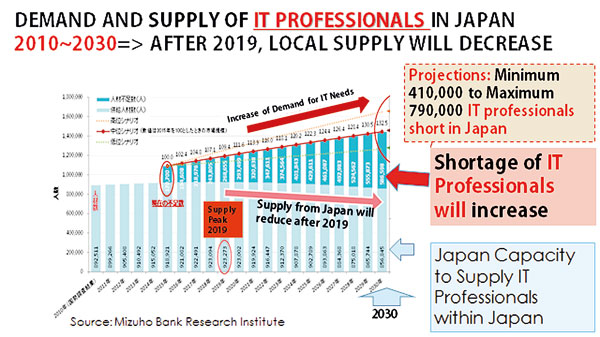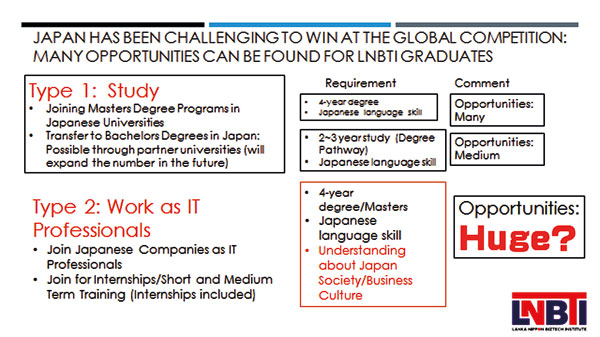Why Sri Lankan Graduates should set their sights on Japan’s lucrative IT Industry
View(s):In the years following World War II and the end of the Cold War, thanks to successful economic reforms implemented by its government, Japan experienced an “economic miracle’. This rapid rise in growth and productivity, brought Japan global recognition as one of the world’s largest economies.
 With Japan experiencing rapid financial prosperity, many countries within the Asian subcontinent chose to follow in their footsteps, with neighboring countries adopting a “Look East” policy to fast-track their own economic growth.
With Japan experiencing rapid financial prosperity, many countries within the Asian subcontinent chose to follow in their footsteps, with neighboring countries adopting a “Look East” policy to fast-track their own economic growth.
Every big economy has a big vision. For China this is “Made in China 2025”, for Europe, this is “Industry 4.0”, Asia takes this as Smart Cities, and for North America this is the Industrial Internet. As other countries align their economies to suit increasingly busy lives, Japan has chosen the path of improving society. For Japan, this concept of development is grounded in “Society 5.0”.
Society 5.0, or the fifth step of society, is a super smart society that uses the best possible technologies to make lives easier for the people. Society 5.0 is a society where people live safe and comfortable lives with more than enough time to enjoy life and said comforts.
Recent times have brought about a bleak outlook for Japan, with a shrinking population contributing to its economic woes. Low fertility rates and the unwillingness to have children, have resulted in dwindling numbers of births in the country. This results in fewer young people available to enter the workforce and take over as the aging populous retires. This has earned Japan the title as the world’s greyest nation with over 28% of its residents being over the age of 65 (Figure 1). Indeed integration of Society 5.0 will allow the country to overcome many of the pitfalls associated with its population decline and reinvigorate its stagnant economy through the creation of opportunities, especially for migrant workers.

Figure 1
As manual labour ignited the industrial revolution, the transformation of Society 5.0 is enabled by I.T. professionals. With this gigantic transformation rolling out, Japan is and will be on the lookout for highly skilled graduates in the foreseeable future. Japan has projected a deficit of 410,000 to 790,000 IT professionals by the end of 2030 (Figure 2).
The Japanese labour market considers some key aspects when allowing foreigners into their career opportunities. Their highest priority is the individual’s understanding of the Japanese culture and business etiquette. The other two aspects they consider are the level of their skills and Japanese language abilities.
3 Ways to Enter Japan as an IT Professional
When it comes to Sri Lankan IT professionals there are three main ways to get into Japanese high skilled career pathways.
“Japanese Language School and a University in Japan”: Completion of a Japanese language course in a Japanese language school in Japan for a duration of 2 years qualifies an individual to join a Japanese university after sitting for an entrance examination. Completion of a bachelor’s degree takes an average of 6 years, while a master’s degree requires an additional 2 years for completion. This means that an individual spends an average of 8 years, to simply seek employment as an IT professional.
The process of entering a Japanese Language school from Sri Lanka has become a tedious process. According to the data published by the “Nikkei Times Newspaper” in August 2019, the visa approval rate for Sri Lankan students drastically decreased, and in the Kanto area it was even less than 1% of the applicants. It was the same for neighboring countries like Bangladesh, Nepal and Myanmar.

Figure 2
“Degree in Sri Lanka and master’s and/or Doctoral Degree in Japan”: The second way to qualify for Japan’s highly skilled career pathways, is by completing a bachelor’s degree in Sri Lanka in a field that has been identified to show a deficiency in skilled labour, thereafter joining a Japanese university for a masters or a doctorate programme. Studying in a Japanese university will further afford an individual with professional Japanese language abilities and the understanding of Japanese society. A Bachelor’s Degree followed by a Postgraduate degree qualification in Japan will ensure an individual’s skill level is on par with Japan’s high standards. This path will open up jobs in high-skilled professions for the opportunity seeker. However, it is still quite difficult for a student from a country like
Sri Lanka where Japanese language and/or Japanese characters are not used to enter a degree programme directly. Even
in recent times, very few Japanese Universities cater for English
speaking students.
Both these ways are considerably difficult, expensive, and riddled with tedious red tape considering expensive tuition and limited opportunities for students to work part time. Foreign students are allowed to work only for 28 hours per week. Expenses for living and studying in Japan are much more than the meagre earnings of a part time job. Some foreign students face difficulties to find part-time jobs to their preference due to limitations brought about by language and cultural differences. Working beyond the allowed number of hours is illegal, and students who do so, risk deportation back to their home country.
“Japan-Oriented Degree Pathway in Sri Lanka and University in Japan”: The third, and considerably less expensive, less time-consuming, and less tedious way of securing a position in a high paying skilled job in Japan is to complete the triple skills required for the Japanese skilled labour market, right here in Sri Lanka. In addition to the IT skills, if a basic understanding about Japanese society and business culture as well as a sufficient level of Japanese language capability is available, transferring to a Japanese university and/or, eventually becoming an IT professional in Japan would be easier when compared to the previous two methods (Figure 3).

Figure 3
A Degree pathway is a good choice for young students to receive easy exposure to Japanese society as an IT Professional. Finishing the first three years of IT education in Sri Lanka while acquiring the required skills to enter Japanese society, a successful student will be able to join a Japanese university of their choice, either in the snowy Sapporo area, or in a rather warm Kyushu area, or in the beautiful Kanazawa area.
LNBTI is the first and foremost higher education institute established by a Japanese enterprise, not only in Sri Lanka but in the whole South Asia to offer a secured pathway to enter Japan and work as an IT Professional. Through the collaborative programs with several leading Japanese universities in various parts of the country, graduates of LNBTI would be able to achieve their dreams of becoming IT professionals in Japan within a minimum period of time. Furthermore, the opportunity to complete the first 3 years of their degree programme in Sri Lanka is considerably less expensive when compared to the costs of living and studying in Japan.
LNBTI (Lanka Nippon Biz Tech Institute) operates under a philosophy that goes beyond merely educating our students. As an institute deeply rooted in Japanese teachings, our degree pathway programmes combine language and soft skill training to enable our nation’s youth to pursue rewarding career opportunities in Japan. Our experience in the field of IT education has indeed shown us that our winning formula of providing an all-rounded curriculum continues to make our graduates some of the most sought after in the industry, both here and overseas.
Sri Lankan and Japanese experts who are familiar with both countries take the leadership in endorsing the authentic Japanese Quality Higher Education at LNBTI. In addition to regular course structure taught at LNBTI, institute includes enriching curricular experiences by way of workshops and seminars conducted by Japanese lecturers. The institute provides students with opportunities to visit Japan through short-term study tours.
Profile of the writer: Prof. Ananda Kumara is a Sri Lankan researcher residing in Japan and some of his past involvements include in Lever Brothers Ltd (Sri Lanka), Kelaniya University (Sri Lanka), United Nations Center for Regional Development (UNCRD), and Suzuka International University and Tokyo Institute of Technology. He was also selected for the Deputy President position of the Suzuka International University, at a time which was extremely rare for a foreigner to hold such a higher-level managerial position in a Japanese University.
Prof. Ananda Kumara is the founding dean, faculty of foreign studies at Meijo university in Japan. Meijo university is one of the most prestigious universities in Japan, which was able to win Nobel Prizes twice (for Physics in 2014 – invention of Blue LED and for Chemistry in 2019 – invention of Lithium Battery) within a period of just five years. The faculty established under the leadership of Dr. Kumara became the most popular faculty among all nine faculties of Meijo University, according to annual student surveys.
Prof. Kumara was awarded the prestigious Japan International Corporation Agency (JICA) President’s Award for the year 2020 for his valuable contributions in Japan. Prof. Kumara was the first foreigner living in Japan & the first Sri Lankan to be awarded with this prestigious award. He also serves as a member of the advisory board at LNBTI.



